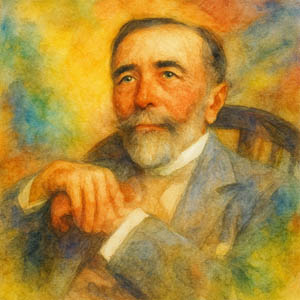~ Joseph Conrad
 Polish-born writer Joseph Conrad (1857–1924), born Teodor Józef Konrad Korzeniowski, entered the world under occupation in Berdyczów—now in Ukraine. A childhood marked by exile and loss shaped the inner landscapes that later filled his novels.
Polish-born writer Joseph Conrad (1857–1924), born Teodor Józef Konrad Korzeniowski, entered the world under occupation in Berdyczów—now in Ukraine. A childhood marked by exile and loss shaped the inner landscapes that later filled his novels.
Before becoming an author, Conrad spent sixteen years as a merchant seaman, traveling through far corners of the world—Australia, Africa, South America, the South Pacific. From those journeys he carried back not souvenirs, but stories: men in moral storms, choices made in darkness, and small, steady sparks of courage.
“I rather dream a novel than write it, for the dream of the work is always much more lovely than the reality of the thing in print,” he admitted. Still, with fierce perseverance, he taught himself English and completed his first novel, Almayer’s Folly, in 1895.
His sea-torn landscapes came alive in Lord Jim (1900) and The Shadow-Line (1917), books that wrestled with honor, doubt, life and death, and the fragile line between good and harm. “All a man can betray,” Conrad wrote, “is his conscience.”
His most haunting creation, Heart of Darkness, ventured into the heart of the Congo and into the shadows of the human spirit. The novel later inspired Francis Ford Coppola's film Apocalypse Now and remains one of literature’s most enduring moral mirrors.
To Conrad, imagination was the great compass. “Imagination, not invention, is the supreme master of art as of life,” he wrote—an echo to anyone facing their own uncharted seas.
His work reminds us that courage is often quiet: a willingness to face what comes, even when the way ahead is dim.
More Joseph CONRAD Quotations
 Face what comes with a steady heart. ✨
Face what comes with a steady heart. ✨
